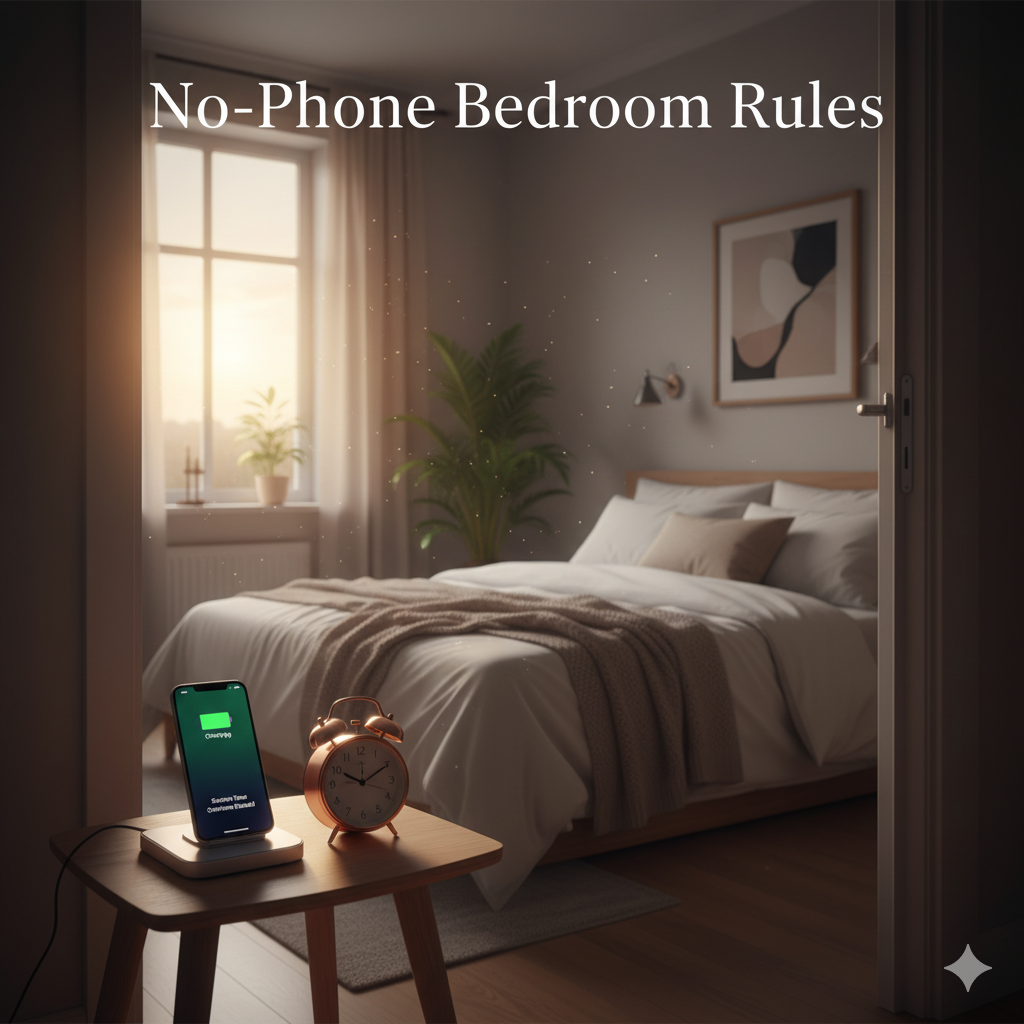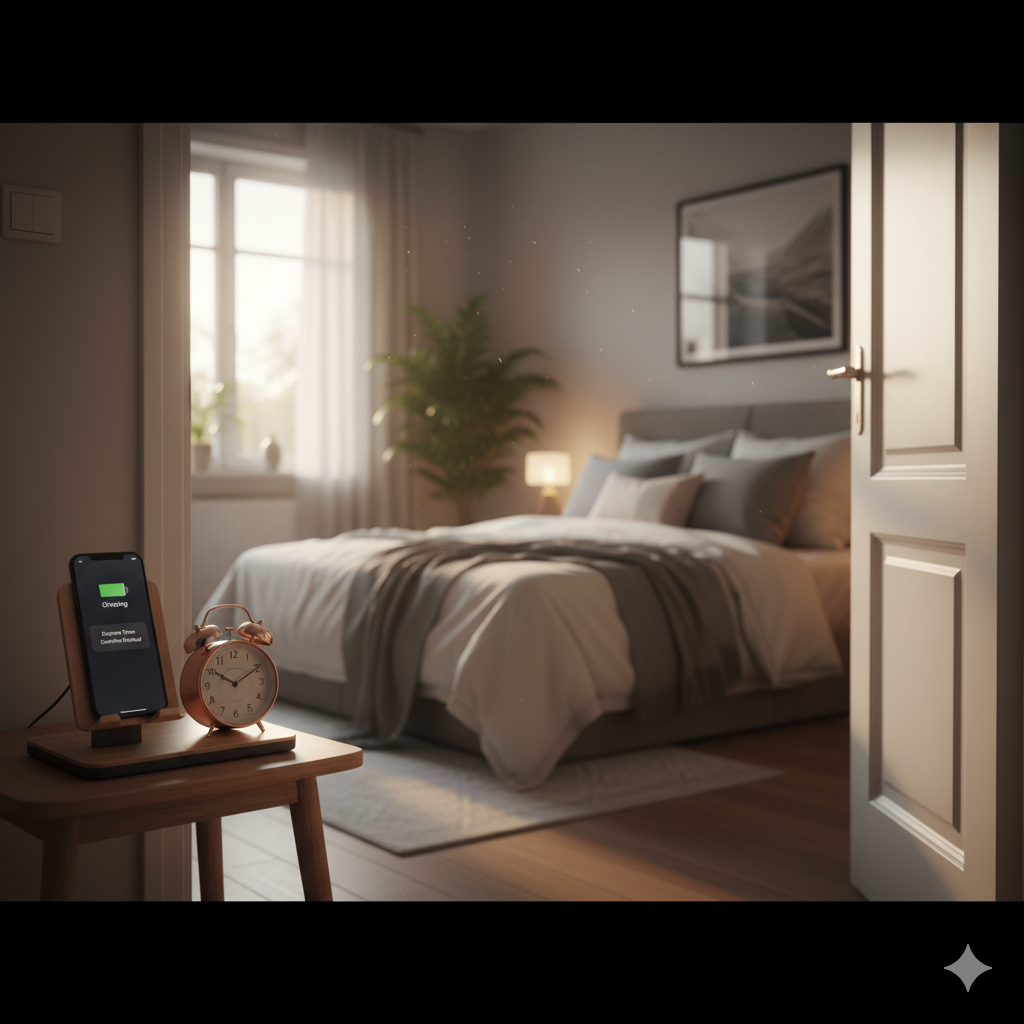Do you bring your phone to bed with you every night? Is checking social media the last thing you do before closing your eyes and the first thing you do when you open them? If so, you’re not alone. Our bedrooms, once sanctuaries of rest, have often become extensions of our digital lives, buzzing with notifications and endless scrolls.
But what if I told you that one simple change could dramatically improve your sleep, reduce your anxiety, and transform your mornings? Imagine waking up feeling truly refreshed, rather than instantly overwhelmed by the digital world.
Welcome to your guide on No-Phone Bedroom Rules – a powerful set of habits designed to help you reclaim your sanctuary. This isn’t about deprivation; it’s about making conscious choices that foster genuine rest and peace, leading to better sleep and significantly less anxiety.

The Hidden Impact of Phones in the Bedroom
That glowing screen and constant connection might seem harmless, but bringing your phone into the bedroom has a sneaky, detrimental effect on your well-being:
- Blue Light Blues: The blue light emitted from screens (phones, tablets, laptops) suppresses melatonin, the hormone that signals to your body it’s time to sleep. This disrupts your natural sleep-wake cycle, making it harder to fall asleep and reducing the quality of your rest.
- Constant Stimulation: Before-bed scrolling floods your brain with information, notifications, and emotionally charged content. This keeps your mind active and alert, making it difficult to switch off and relax into sleep.
- Anxiety Amplifier: Checking work emails, social media feeds, or news before bed can trigger stress, comparison, and worry, sending your anxiety levels soaring just when you need to wind down.
- Sleep Interruption: Even if you manage to fall asleep, a buzzing notification or the temptation to check “just one more thing” can wake you up, fragmenting your sleep.
- Morning Overwhelm: Starting your day by immediately diving into your phone means you’re reacting to the digital world instead of proactively shaping your morning, often leading to increased stress and distraction from the get-go.
Recognizing these impacts is the first step towards creating a healthier sleep environment. Ready to break free? Let’s dive into the proven habits that will transform your bedroom into a true sanctuary.
Habit 1: Implement a Digital Curfew (At Least 60 Minutes Before Bed)
This is the golden rule, the foundation of all No-Phone Bedroom Rules. You need a buffer zone between your screen and your pillow.
How it Works:
- Set a Hard Stop: Decide on a specific time each evening when all non-essential screens (phones, tablets, laptops, even TV) are powered down or moved out of reach. For most people, at least 60 minutes before your desired bedtime is ideal, but 90 minutes or even two hours is even better.
- Establish a “Charging Station”: Designate a spot outside your bedroom (e.g., in the kitchen, living room, or hallway) where all devices go to charge overnight. This physically removes the temptation.
- Inform Loved Ones: Let family and close friends know about your digital curfew. Explain that you won’t be responding after a certain time, but they can still call for emergencies.
Why it Works for Better Sleep & Less Anxiety:
- Melatonin Production: Giving your eyes a break from blue light allows your body to naturally produce melatonin, signaling that it’s time to wind down.
- Mental Decompression: This buffer period gives your brain time to process the day’s events and shift into a relaxed state, rather than being jolted into sleep from high stimulation.
- Reduced FOMO: Knowing the phone is out of reach eliminates the constant mental battle of “should I check it?”
Habit 2: Invest in an Analog Alarm Clock (Ditch the Phone Alarm)
If your phone is your alarm clock, it’s inherently in your bedroom. This habit provides a simple, yet powerful, solution.
How it Works:
- Buy a Dedicated Alarm Clock: This can be a classic digital clock, a sunrise alarm clock, or even an old-school wind-up model. Choose one you like!
- Place it Conveniently: Position it so you can easily reach it to turn off the alarm, but not so close that you hit snooze endlessly.
- Charge Phone Elsewhere: With a dedicated alarm, there’s no longer any “need” for your phone to be in the bedroom.
Why it Works for Better Sleep & Less Anxiety:
- Physical Separation: This forces your phone out of the bedroom, making it easier to stick to your digital curfew.
- Intentional Mornings: Prevents the dreaded “scroll-first-thing” habit, allowing you to start your day calmly and proactively, rather than reactively checking messages and social media.
- Reduces Temptation: Without your phone within arm’s reach, that groggy, half-awake urge to “just check” is significantly diminished.
Habit 3: Create a Relaxing Bedtime Routine (Replace Scrolling with Calm)
Removing your phone leaves a void. This habit is about filling that void with calming activities that prepare your body and mind for rest.
How it Works:
- Choose Calming Activities: Select 2-3 activities you enjoy that don’t involve screens.
- Read a Physical Book: Engage your imagination without blue light.
- Listen to a Podcast/Audiobook: Choose something soothing or informative but not too stimulating.
- Journal: Write down your thoughts, worries, or gratitudes to clear your mind.
- Light Stretching or Gentle Yoga: Release physical tension.
- Meditate or Practice Deep Breathing: Use an app earlier in the evening, or simply focus on your breath.
- Take a Warm Bath or Shower: The drop in body temperature afterward promotes sleep.
- Talk with a Partner: Have a low-key, connecting conversation.
- Be Consistent: Try to do your routine around the same time each night to train your body for sleep.
Why it Works for Better Sleep & Less Anxiety:
- Signals to Your Body: A consistent, calming routine tells your body and mind that it’s time to transition from activity to rest.
- Mental Decompression: These activities help clear your mind of the day’s stressors, reducing racing thoughts that contribute to anxiety and sleeplessness.
- Positive Association: Your bedroom becomes a place associated with peace and relaxation, not digital stimulation.Image of

Habit 4: Optimize Your Bedroom Environment (Beyond the Phone)
While the phone is a major culprit, a truly restful bedroom involves more than just its absence. This habit focuses on creating an ideal sleep sanctuary.
How it Works:
- Darkness is Key: Use blackout curtains or blinds to block out all external light. Even small amounts of light can disrupt melatonin production.
- Cool Temperature: Most sleep experts recommend keeping your bedroom cool, typically between 60-67°F (15-19°C).
- Silence (or White Noise): Eliminate distracting noises. Use earplugs if necessary, or a white noise machine/app (on a device outside the bedroom, on a timer) to mask sudden sounds.
- Comfortable Bedding: Invest in a comfortable mattress, pillows, and sheets that suit your preferences.
- Declutter and Clean: A tidy, clean bedroom contributes to a calm mind. Remove work materials, clothes piles, and anything that creates visual stress.
Why it Works for Better Sleep & Less Anxiety:
- Sensory Optimization: By controlling light, temperature, and sound, you create an environment that naturally promotes deep, uninterrupted sleep.
- Reduced Mental Clutter: A clean and organized space can help quiet a busy mind, making it easier to relax and fall asleep.
- Stress-Free Zone: Your bedroom becomes a dedicated retreat, free from the physical and mental reminders of daily stressors.
Habit 5: Practice Mindful Mornings (Resist the Immediate Digital Dive)
The benefits of No-Phone Bedroom Rules extend beyond sleep. How you start your day sets the tone for everything that follows.
How it Works:
- Allow for an Analog Awakening: When your non-phone alarm goes off, resist the urge to immediately grab your phone from its charging station.
- Start with Self-Care: Dedicate the first 15-30 minutes of your day to yourself before engaging with screens.
- Hydrate: Drink a glass of water.
- Stretch or Move: Get your body gently awake.
- Practice Gratitude: Think of three things you’re thankful for.
- Meditate or Reflect: Spend a few minutes in quiet contemplation.
- Have a Calm Breakfast: Enjoy your meal without digital distraction.
- Batch Your Digital Check-in: After your mindful morning routine, then you can go to your charging station and intentionally check messages, emails, or news for a set amount of time.
Why it Works for Better Sleep & Less Anxiety:
- Proactive vs. Reactive: You start your day on your terms, with intention, rather than instantly being pulled into the demands and opinions of the digital world.
- Reduced Morning Anxiety: Avoiding immediate news headlines or social media feeds prevents early-morning stress and comparison.
- Enhanced Focus: A calm, centered start to the day improves your ability to focus and be productive throughout the day.
- Lasting Peace: Extends the peace cultivated by your phone-free nights into your waking hours.
Embracing the Journey: Patience and Self-Compassion
Implementing No-Phone Bedroom Rules is a journey, not a destination. It takes time, consistency, and a healthy dose of self-compassion.
- Expect Resistance: You might feel a strong urge to check your phone initially. That’s normal! Acknowledge the urge, but don’t give in. It will lessen over time.
- Start Small: If 60 minutes before bed feels impossible, start with 30. Gradually increase as you get more comfortable.
- Celebrate Wins: Every night you successfully keep your phone out of the bedroom is a victory! Acknowledge your efforts.
- Be Kind to Yourself: If you slip up, don’t dwell on it. Simply reset and commit to trying again the next night. Progress, not perfection, is the goal.
- Communicate: Let your partner or family know about your new rules so they can support you.
Conclusion: Your Bedroom, Your Sanctuary, Your Well-being
By adopting these 5 proven habits for better sleep and less anxiety and establishing clear No-Phone Bedroom Rules, you’re making a powerful statement to yourself: your rest, your peace, and your mental health are a priority.
Imagine the profound difference it will make to your life – waking up truly rested, facing the day with clarity, and feeling significantly less anxious. This isn’t just about disconnecting from a device; it’s about reconnecting with yourself and reclaiming the tranquility that is your birthright.
Ready to transform your sleep and reduce your anxiety? Pick one of these no-phone bedroom rules and commit to trying it tonight. Even a small change can create a ripple effect of positive transformation! What’s the first rule you’re going to implement? Share your commitment in the comments below!
Want more practical strategies for building a truly unplugged routine and living a calmer life? Join the Unplugged Routine community and subscribe to our newsletter for exclusive tips and inspiration!